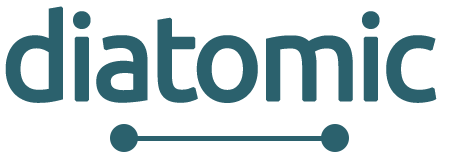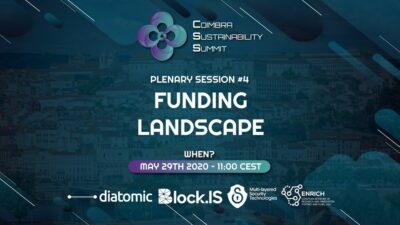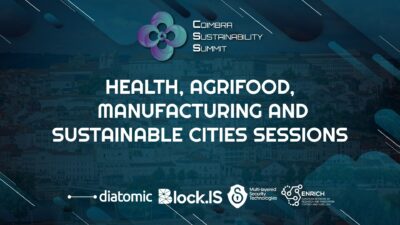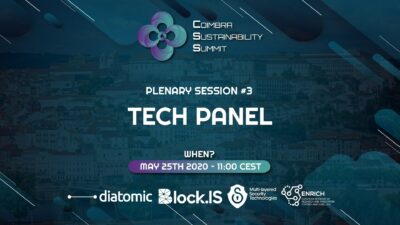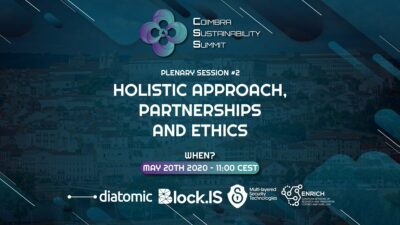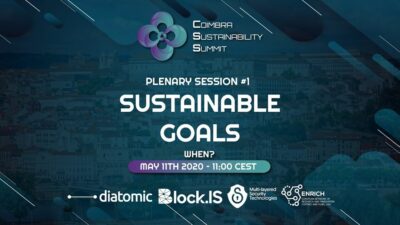The Demo Day kicked off with an opening welcome speech by Dr. Raimund Bröchler of INTRASOFT, providing an overview of the DIATOMIC project and our activities to all of the Demo Day participants.
The introduction was followed by a session where all DIATOMIC Experiments from both open calls had an opportunity to introduce themselves and their solutions with 3-minute pitch presentations. The Experiments’ pitches were followed by sessions with two prominent guest speakers covering topics of value to our Demo Day participants.
The first guest session was a captivating keynote speech by Dr. Katerina Pramatari on the topic of Greece as a Startup Gateway. Dr. Katerina Pramatari is an Associate Professor at the Department of Management Science and Technology at the Athens University of Economics and Business. She is also the Scientific coordinator of the ELTRUN/SCORE research group, the founder of 2 technological start-ups, as well as a key founder of Uni.Fund, an award-winning University accelerator bridging the gap between the corporate world and University start-ups. Dr. Pramatari is also one of the top European academic experts in the fields of Internet-of-Things (IoT), retail and business analytics.
The second guest session involved a presentation by Mr. Georgios Megas of the Hellas National Documentation Centre (EKT), who is also the EC National Contact Point and Expert for ICT & EIC FET in Horizon2020 projects, EIT Health HUB Coordinator for Greece, as well as an Innovation & Technology Transfer Advisor within the ICT sector group of Enterprise Europe Network. His presentation covered topics such as:
- The type of support and services that the EIT Health HUB can offer to our DIATOMIC Experiments who are developing solutions in the Health sector.
- How the Enterprise Europe Network can help companies develop their solutions and tailor them to real market needs.
- Other accelerators and programmes that start-ups can apply to when they are ready to take their innovation to market.
- Other types of funding that our experiments can apply for after their participation in DIATOMIC, and the criteria they would need to satisfy in order to secure the funding.
- Providing an overview of the proposed Digital Europe Programme.
The presentation was followed by a Q&A session between our guests and the Demo Day participants, which led to fruitful discussions and useful conclusions on the topics relevant to our DIATOMIC Experiments.
The Demo Day also included Speed dating sessions between Experiments from both of our Open Calls for the purpose of networking, sharing experiences, best practices and lessons learned within their DIATOMIC experiments, as well as business opportunities within their industries and sectors which go beyond DIATOMIC. This is one of the key aspects of the Demo Day because it provided our Experiments with a rare opportunity to meet face-to-face considering their geographical distribution, facilitating quality networking and raising the potential for new business deals and ventures. Our Experiments also had the opportunity to showcase prototypes of their solutions at the venue and provide demonstrations to all interested parties.
The Bootcamp which was held the following day gathered all the Experiments from our second Open Call together with their DIATOMIC coaches, providing an excellent opportunity for face-to-face coaching sessions as well as networking with other Experiments.
The Bootcamp also offered two specialized training sessions.
Our consortium partner Libelium held a technical session on the topic of how to deploy an IoT project in different scenarios. The presentation gave an overview of the IoT market, as well as all the different types of applications for sensors in smart cities and beyond. The three main pillars of IoT solutions were explained, including the type of sensors used, communication protocols and cloud platforms. Case studies of real-life applications were also presented, along with a live demonstration on how to set up and configure a Libelium sensor device.
The second training session held by our consortium partner Fast Track VC was business related and gave useful tips for developing an effective pitch deck for attracting investments. The session covered the types of pitch decks, aims of the different pitch decks, who they are for as well as their formats and recommended content. The training session also gave useful tips and tricks and best practices, along with advice on what different types of investors are looking for, as well as some upcoming investor events that our DIATOMIC Experiments could attend.
All in all, it was an exciting two days that facilitated exchange of valuable information, sharing of ideas and networking with creative people, and we can’t wait for our next meetup!
